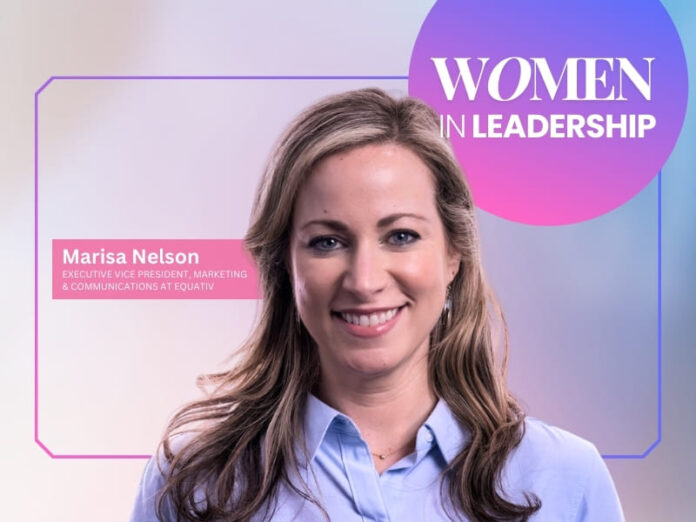Interview with Marisa Nelson of Equativ
Have you ever wondered how some leaders navigate uncharted paths to success? Discover how mentorship and building strong relationships helped adtech leader Marisa Nelson rise from events to overseeing a rebrand and recapitalisation at Equativ.
Could you share your journey to becoming a leader in the adtech industry?
“My path into adtech was anything but straightforward; it was shaped by valuable relationships with the inspiring mentors who guided me along the way.
Starting out in events helped develop my flair for efficient operational and project management. As my interest in client relations and brand building grew, these abilities set me in good stead for a transition to the agency world, where I made two connections that would transform my career: Dan Slivanoski and Heather McKim, the current CMO and former SVP of Marketing at DoubleVerify respectively.
I admired both of these extremely talented mentors greatly, and they were incredibly influential in helping me grow and pivot – including bringing me with them when they moved into adtech. Together, we built the RhythmOne brand from the ground up, and, from there, my journey truly took off!”
Overseeing both a rebrand and a recapitalisation is a significant challenge. How did you successfully approach these initiatives at Equativ?
“Joining the business shortly before a simultaneous rebrand and recapitalisation meant I was immediately faced with the invigorating and challenging task of not just mastering my new role, but also handling the numerous components involved. The factor I feel made the biggest difference in handling these significant changes was taking an even-handed approach that gave equal consideration to two main areas: purely business-oriented and people-centric activities.
Creating effective and aligned marketing plans depended on quickly gaining a deep understanding of the company’s (previously named Smart AdServer) extensive 20-year ad tech heritage and rich range of solutions.
On the business side, creating effective and aligned marketing plans depended on quickly gaining a deep understanding of the company’s (previously named Smart AdServer) extensive 20-year ad tech heritage and rich range of solutions. This was in addition to its collective objectives and growth strategies following its merger with LiquidM and DynAdmic to become Equativ. Just as important was collaborating with the right stakeholders and establishing clear roles from the outset to ensure smooth execution.
On the personal side, it was crucial to ensure my team felt supported and included in the planning from the very start. Within my first year at the company, I had developed a cross-functional and international department that worked from Paris, New York and London to deliver a cohesive and compelling new brand identity. Across the newly unified organisation, I also worked to foster a sense of inclusion, education, and excitement among all employees to help bring the projects to life and drive true lasting success.”
What are the essential elements of a successful company rebrand, especially in a rapidly evolving industry like adtech?
“There are several essential elements that contribute to a successful company rebrand. Some of my top ones include:
- A clear vision and strategy to ensure messaging resonates with both internal and external audiences.
- Understanding market trends, competition, and audience needs to develop a strategy that makes you stand out.
- Having the right cross-functional team – along with engaged stakeholders like the executive team, advisors, employees, clients, and partners – for effective execution and advocacy.
- An integrated marketing plan that leverages top-performing marketing channels – such as content marketing, PR, events, as well as digital channels like website, email, social media, and other traditional outreach – helps maximise the rebrand’s reach and impact.
- The rebrand should also reflect and promote the company’s culture and talented employees, fostering employee engagement and advocacy.
- Finally, having a plan that can be flexible based on feedback and market responses is vital for maintaining effectiveness in a rapidly changing environment.”
How do you empower and elevate women within your organisation and the broader industry?
“I firmly believe in leading by example and ensuring I’m accessible to anyone in the company who needs professional development guidance. I always encourage my female peers to build strong support networks and seek mentors, whether within their organisation, through peer groups, or by networking at industry events. It’s important for women to have confidence in their abilities, leverage their experiences, and advocate for themselves—often, it’s our own self-doubt that holds us back, not external obstacles.
It’s important for women to have confidence in their abilities, leverage their experiences, and advocate for themselves—often, it’s our own self-doubt that holds us back, not external obstacles.
I’m proud to work closely with our diversity, equity and inclusion (DE&I) team on multiple initiatives. From a content and analytics perspective, this includes producing detailed DE&I progress reports, corporate social responsibility (CSR) guides, and continually refining our employee value proposition programme.
In terms of team activities, I also support the promotion of events like Heritage Days, Mental Health Awareness Month, and International Women’s Day to cultivate greater diversity and inclusion for our workforce and global talent – regardless of gender.”
You’ve played a key role in marketing and communications around major mergers, including Equativ’s merger with Sharethrough. What are the critical steps in successfully managing the communications and branding aspects of such significant changes?
“I’d say top-down transparency is absolutely essential. Clear, consistent communication across all teams—from the c-suite to those executing the details—is vital for building a thorough plan that reaches both internal and external audiences. Externally, keeping clients, partners, and the broader industry informed as part of the marketing strategy is key. This ripple effect of advocacy, both inside and outside the company, is incredibly valuable, and when done well, leads to strong, positive results for the company.”
As someone who thrives in the ever-changing tech landscape, how do you stay ahead of industry trends?
“To stay ahead of industry trends, I make it a point to read thought leadership content shared across various platforms daily. LinkedIn is my main source for news, industry updates, and insights from experts and peers—it’s the only platform where I actually engage with the comments! I also appreciate the content my colleagues share in our internal Slack channels and during educational webinars, as I often gain valuable insights from them. Additionally, I attend conferences and participate in industry events to stay informed about emerging trends and market updates.”
What qualities do you believe are essential for a leader in today’s digital and tech-driven world?
“In my opinion, key qualities for a leader in ad tech include being nimble; allowing for quick pivots in response to change. Strategic thinking also helps with anticipating trends, shifts, and opportunities to realise a vision. Strong communication skills are crucial for enhancing collaboration and aligning with company objectives, while emotional intelligence builds relationships and fosters a positive work environment. Lastly, a commitment to continuous learning is key for remaining relevant and effectively guiding teams.”




































